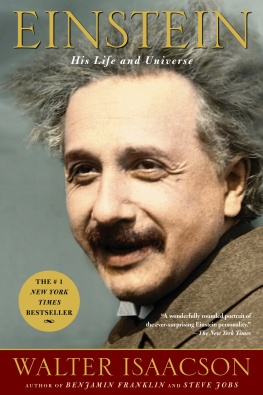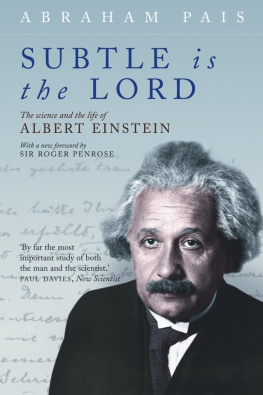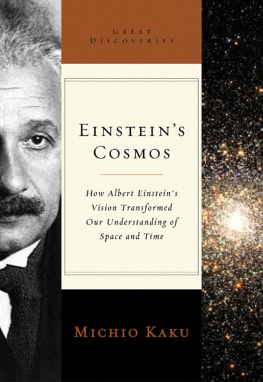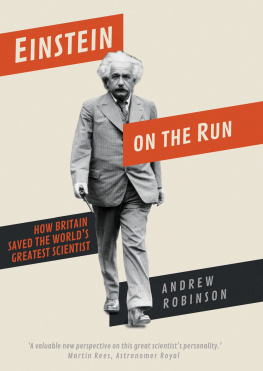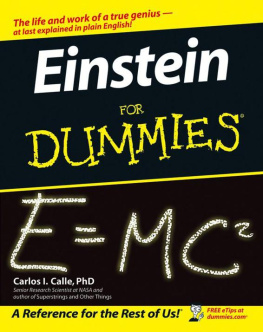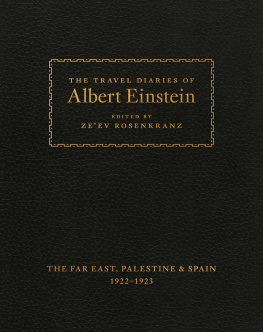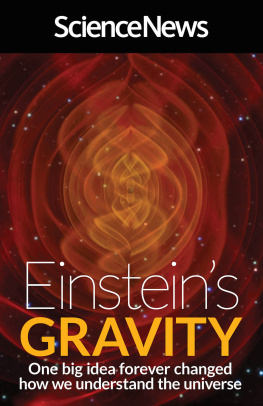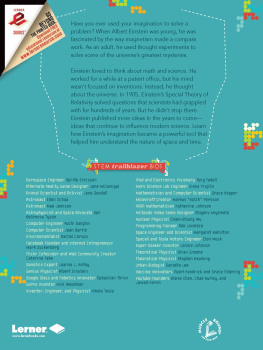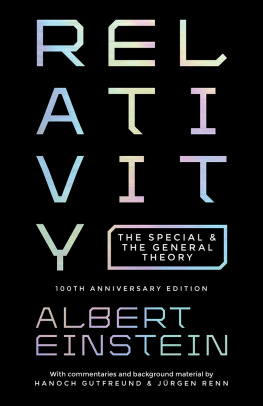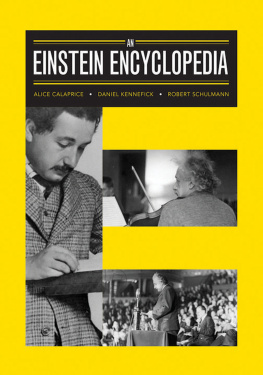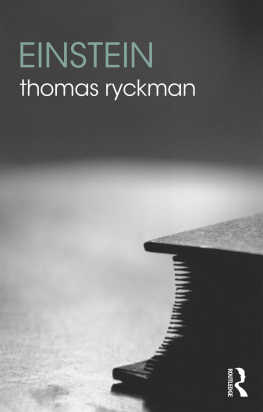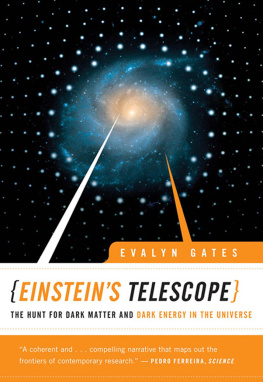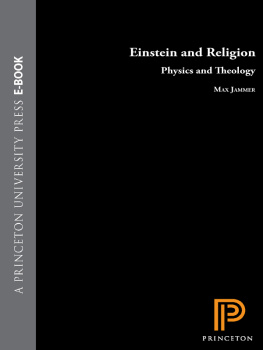EINSTEINS JEWISH SCIENCE
EINSTEINS JEWISH SCIENCE
Physics at the Intersection of Politics and Religion
Steven Gimbel

2012 Steven Gimbel
All rights reserved. Published 2012
Printed in the United States of America on acid-free paper
Johns Hopkins Paperback edition, 2013
9 8 7 6 5 4 3 2 1
The Johns Hopkins University Press
2715 North Charles Street
Baltimore, Maryland 21218-4363
www.press.jhu.edu
The Library of Congress has cataloged the hardcover edition of this book as follows:
Gimbel, Steven, 1968
Einsteins Jewish science : physics at the intersection of politics and religion / Steven Gimbel.
p. cm.
Includes bibliographical references and index.
ISBN-13: 978-1-4214-0554-4 (hdbk. : alk. paper)
ISBN-10: 1-4214-0554-7 (hdbk. : alk. paper)
ISBN-13: 978-1-4214-0575-9 (electronic)
ISBN-10: 1-4214-0575-X (electronic)
1. Relativity (Physics)Philosophy. 2. Einstein, Albert, 18791955Philosophy. 3. Jewish Science. I. Title.
QC173.55.G55 2012
530.092dc23 2011036254
A catalog record for this book is available from the British Library.
ISBN-13: 978-1-4214-1182-8
ISBN-10: 1-4214-1182-2
Special discounts are available for bulk purchases of this book. For more information, please contact Special Sales at 410-516-6936 or specialsales@press.jhu.edu.
The Johns Hopkins University Press uses environmentally friendly book materials, including recycled text paper that is composed of at least 30 percent post-consumer waste, whenever possible.
For my grandparents,
Fran and Milt Gimbel
and Betty and Leonard Gallant
CONTENTS
INTRODUCTION
Einsteins Jewish Science
CHAPTER ONE
Is Einstein a Jew?
CHAPTER TWO
Is Relativity Pregnant with Jewish Concepts?
CHAPTER THREE
Why Did a Jew Formulate the Theory of Relativity?
CHAPTER FOUR
Is the Theory of Relativity Political Science or Scientific Politics?
CHAPTER FIVE
Did Relativity Influence the Jewish Intelligentsia?
CHAPTER SIX
Einsteins Liberal Science?
CONCLUSION
Einsteins Cosmopolitan Science
EINSTEINS JEWISH SCIENCE
INTRODUCTION
Einsteins Jewish Science
If my theory of relativity is proven successful, Germany will claim me as a German and France will declare that I am a citizen of the world. Should my theory prove untrue, France will say that I am a German and Germany will declare that I am a Jew.
Albert Einstein to the French Philosophical Society, April 6, 1922
Sometimes even the cynics arent cynical enough. Despite its success, indeed because of it, Albert Einsteins theory of relativity was denigrated by Nazi sympathizers, who dismissively labeled it as Jewish science during the run-up to World War II. To their chagrin, Einstein was succeeding in radically revising the scientific communitys understanding of space, time, matter, energy, motion, and gravitation.
Of course, relativitylike all revolutionary ideashas had more than its share of detractors, a few hanging on until this very day. Many of the supposed problems with the theory are what philosopher Hans Reichenbach, one of Einsteins earliest defenders, called off-key notes, that is, uninformed objections from opponents who failed to understand the theory. It is not unusual for physicists today to receive letters and e-mails from nonscientists with a new proof that Einstein is wrong.
But some objections came from the world of physics in which renowned authorities bristled at the thought of an unknown patent clerk with no Ph.D. undermining concepts such as absolute space, absolute time, and luminiferous aether that had been the standard fare of physical theory for generations. These critics included some of Einsteins personal heroes: the German physicist and father of positivism, Ernst Mach; the French polymath, Henri Poincar; and the Dutch theoretician, H. A. Lorentz. Their concerns would seem unremarkable in normal scientific discourse: lack of supporting experimental evidence, the existence of competing theories, or the historical fruitfulness of concepts Einstein rejects. Over time, these criticisms were successfully addressed and relativity became so strongly accepted that it is now viewed as part of classical physics.
But then there were other adversaries. Philipp Lenard, winner of the Nobel Prize in physics in 1905, became one of the leading spokesmen for the Aryan physics movement that sought to cleanse German science of what it saw as its modern corrupting Semitic influences. In the foreword to German Physics, a four-volume encyclopedia of Aryan science, he wrote:
German physics? you will ask.I could also have said Aryan physics or physics of the Nordic type of peoples, physics of the probers of reality, of truth seekers, the physics of those who have founded scientific research.Science is international and will always remain so! you will want to protest. But this is inevitably based upon a fallacy. In reality, as with everything that man creates, science is determined by race and blood Nations of different racial mixes practice science differently.
Einsteins theory of relativity, the proponents of Aryan physics argued, was not only wrong, but in steering physics away from the true German approach, it was also malignant.
Nowadays, we wave off the claim that relativity is Jewish science as just another example of the intellectual bankruptcy and ideological absurdity of National Socialism. We are quick to dismiss this claim, as we are of all others made by Hitler and his minions, in part because we know them to have been merciless propagandists seeking to advance their dehumanizing agenda through psychological, as well as actual, warfare. We therefore easily lump together all Nazi arguments into the single category of sociopathic nonsense.
But while some of the arguments offered in defense of the theory of a master race were surely made for marketing purposes only, others were proposed seriously and need to be honestly debunked lest they arise again clothed in new robes. We know that great minds like Nobel laureate Lenard, famed mathematician Ludwig Bieberbach, and Martin Heidegger, one of the most influential philosophers of the twentieth century, all stood shoulder to shoulder with their Nazi brethren. Such minds cannot be simply dismissed without peril.
It is understandable why we paint all National Socialist arguments with such a broad brush. There is moral and intellectual comfort to be had in taking all Nazis to be inhuman creatures driven by an irrational ideology based on completely erroneous assumptions, their philosophies devoid of any deep and legitimate intellectual work requiring serious engagement. Summary dismissal signifies that the Nazis, their sympathizers, and their enablers were not like us and that we are not like them. Surely, we would not have allowed the crimes that they perpetrated to have happened, or worse, participated in them ourselves. We are thus safe from their influence, insulated in the same way that they wished to be from ideas that make us uncomfortable by banishing them with the same oversimplifying tactics that they practiced.
For our own peace of mind, however, we may be quick, too quick, to write off the claims made in defense of Nazisms ghastly creed. This is not to argue for any sympathy toward Nazism; rather, it is to say that perhaps there are insights to be gleaned from a deeper investigation of certain claims made in the advance of it. Could there be new seeds growing from the intellectual dung heap; flowers that can be transplanted into more nourishing and fertile soil?
Next page

